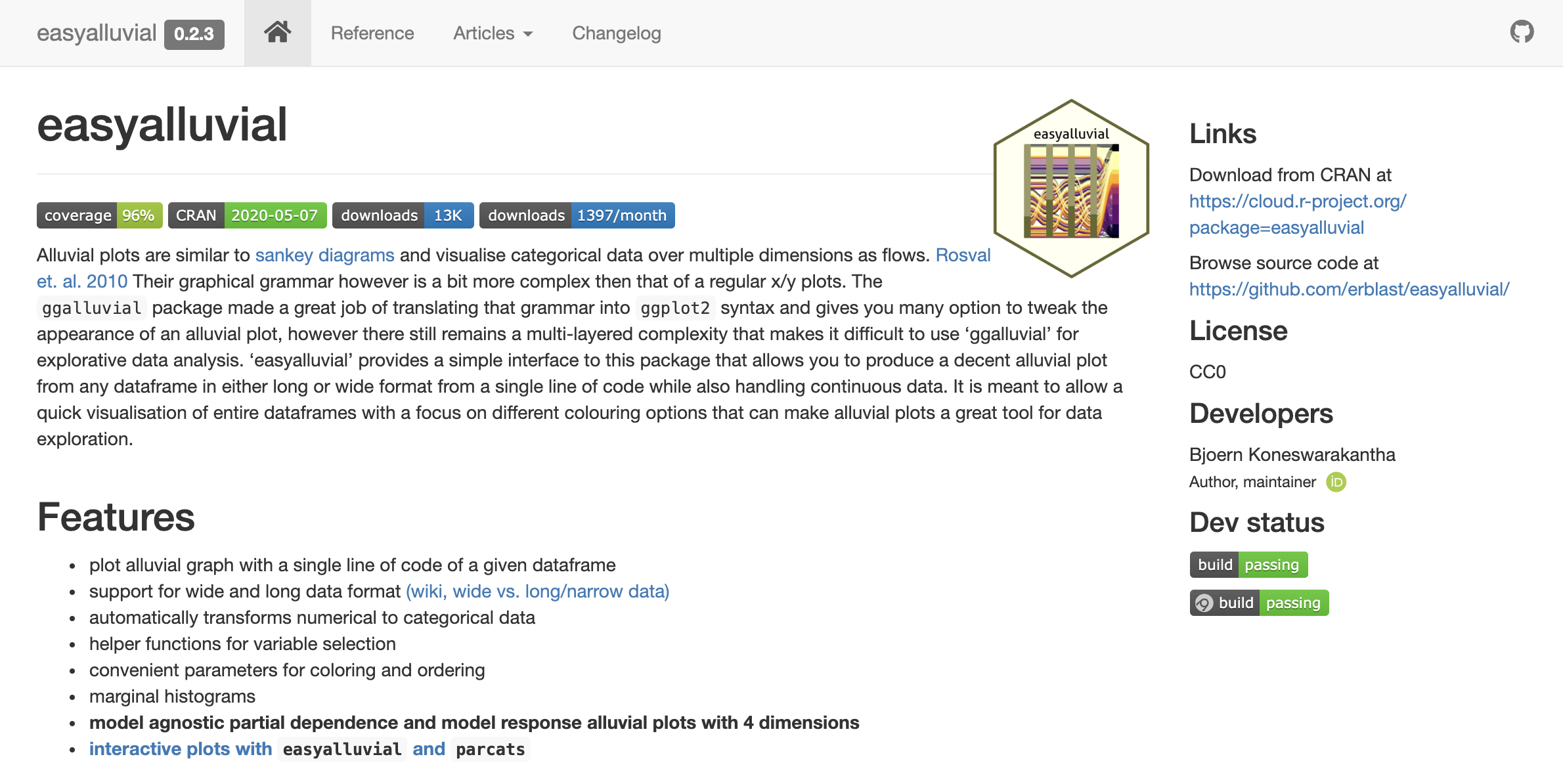easyalluvial 0.2.3 released
easyalluvial allows you to build exploratory and interactive alluvial plots (sankey diagrams) with a single line of code while automatically binning numerical variables. This release 0.2.3 ensures dplyr 1.0.0 compatibilitiy and now builds a slick pkgdown documentation website and makes better use of Travis CI using multiple builds to test compatibility with development versions of selected package dependencies.
New ‘pkgdown’ Documentaion
If I knew how easy it was to create a pkgdown documentation website I would have done it long time ago. The easyalluvial documentation used to consist of only the README.md file with links to blogposts that would contain more detailed tutorials. Now everything can be found in one place.
https://erblast.github.io/easyalluvial/

New ‘Travis CI’ Configuration

The real change however, is that I am now making better use of Travis CI. I made it a habit to develop in a designated branch and use pull requests to merge with the master branch. Travis CI now controls the merge of the pull request only allowing it if all checks in all builds have passed. In addition to simply running package checks Travis CI now uses multiple parallel builds. One build each for R-release and R-devel and a couple of more for checking compatibility with development versions of selected tidyverse dependencies. Another build checks the reverse dependency parcats.
Even cooler Travis CI is setup to build the pkgdown website and publishes it immediately to a separate github pages branch. So me forgetting to build the website before commiting to github will not effect the documentation. There is a great blogpost with instruction on how to set-up Travis CI to deploy github pages.
Since I set up many parallel builds in different environments I only want one of them to render the documentation. Therefore I created an environment variable PKGDOWN which is set to yes in only one of the builds and set to no in the others. The deploy section will only run if PKGDOWN=yes on the master branch.
For R-packages the script section of each build is pre-configured. In order to integrate the building of the pkgdown website into the script part of the r-release build I had to overwrite it. Which required me to also add commands for installing package dependencies and running package checks.
This is the content of the final .travis.yml
language: R
R:
- release
sudo: false
cache: packages
r_packages:
- covr
matrix:
include:
- r: devel
after_success:
- export PKGDOWN=no
- r: release
before_script:
- Rscript -e 'install.packages(c("earth", "tidyverse", "mlbench", "pkgdown"))'
- Rscript -e "devtools::install_deps('.', dependencies = 'suggests')"
script:
- Rscript -e "devtools::check('.', error_on = 'note')"
- Rscript -e 'pkgdown::build_site(run_dont_run = TRUE)'
after_success:
- Rscript -e 'covr::codecov()'
- export PKGDOWN=yes
- r: release
name: tidyr-devel
before_script: Rscript -e "remotes::install_github('tidyverse/tidyr')"
after_success:
- export PKGDOWN=no
- r: release
name: dplyr-devel
before_script: Rscript -e "remotes::install_github('tidyverse/dplyr')"
after_success:
- export PKGDOWN=no
- r: release
name: parcats-devel
script:
- git clone https://github.com/erblast/parcats.git
- git clone https://github.com/erblast/easyalluvial.git
- Rscript -e "install.packages('spelling')"
- Rscript -e "devtools::install_deps('easyalluvial/', dependencies = 'suggests')"
- Rscript -e "devtools::install_deps('parcats/', dependencies = 'suggests')"
- Rscript -e "devtools::install('easyalluvial/')"
- Rscript -e "devtools::check('easyalluvial/', error_on = 'note')"
- Rscript -e "devtools::check('parcats/', error_on = 'note')"
after_success:
- export PKGDOWN=no
deploy:
provider: pages
skip_cleanup: true
github_token: $GITHUB_TOKEN # Set in the settings page of your repository, as a secure variable
keep_history: true
local-dir: docs
on:
branch: master
condition: $PKGDOWN = yesMore changes
… NEWS.md
